Big Three Letter Signifies an End to QS-9000
In a joint letter dated August
2002, the Big Three automotive companies informed suppliers
that they must upgrade their quality registration to ISO/TS
16949. The deadlines for transitioning are Dec. 14, 2006,
for suppliers to Ford Motor Co. and General Motors Corp.,
and July 1, 2004, for DaimlerChrysler suppliers. The mandate
ultimately guarantees the end of QS-9000 and the beginning
of a rush to comply and register.
“The agreement between QS-9000 and ISO to include
ISO 9000:1994 text in the QS-9000 third edition standards
document expires on Dec. 14, 2006. Beyond that date, ISO/TS
16949:2002 will replace QS-9000,” states the letter
signed by T.W. Sidlik, executive vice president of procurement
and supply at DaimlerChrysler; Tony Brown, vice president
of global purchasing at Ford Motor Co.; and Bo Andersson,
vice president of worldwide purchasing, production control
and logistics at General Motors Corp.
Essentially, suppliers registered to QS-9000 are strongly
urged to upgrade to ISO/TS 16949:2002 at the expiration
of their current QS-9000 certification and no later than
the final deadline. Suppliers registered to ISO/TS 16949:1999
are required to upgrade prior to the expiration of their
current certificate or by Dec. 15, 2004. ISO/TS 16949:1999
is based on the ISO 9000:1994 standard, which is due to
expire Dec. 15, 2003. The Dec. 15, 2004 deadline reflects
a one-year grace period recognized by the Big Three.
“We’ve found that registration to QS-9000
has not been as effective as we would have liked it to be,”
says Hank Gryn, a member of the ISO/TS 16949 International
Automotive Task Force and representative of DaimlerChrysler.
“We have a completely new registration process in
place with stricter requirements for auditors and certification
bodies.”
In a separate letter to suppliers, DaimlerChrysler set
a July 1, 2004, deadline for its suppliers to switch to
the standard, at which time it will no longer accept QS-9000
or any European automotive quality requirements, such as
VDA 6.1.
“Some suppliers will look at this as a chance to
get a fresh start, and they’ll come out far stronger
and better,” says Radley M. Smith, author of The QS-9000
Answer Book (Paton Press) and the co-author of the QS-9000
requirement. “Others will just look at this as the
cost of doing business. However, I would be surprised if
there’s any drop-off of suppliers who can’t
or won’t invest in the transition.”
“The major point behind the decision is the transition
to the process approach,” notes Gryn. “It’s
a natural upgrade from the old system.” ISO/TS 16949:2002
is aligned with ISO 9001:2000, which replaces the 1994 versions
of ISO 9001, 9002 and 9003 and is based on the process approach.
Information regarding the transition can be obtained from
the Automotive Industry Action Group at
www.aiag.org, the International Automotive Oversight
Bureau at www.iaob.org or
the Society of Motor Manufacturers and Traders Ltd. at www.smmt.co.uk.
The Professional’s Struggle: Balancing
Work and Home Lives
One might think that in this
shaky economy professionals are most worried about keeping
their jobs. Although this is a primary concern, when asked
in a recent survey “What’s your No. 1 concern
about your career in 2002?” nearly one-third of the
respondents said they’d like to better balance their
business and personal demands.
“Recent world events have prompted many people to
reassess their priorities and place greater importance on
personal pursuits,” says Liz Hughes, executive director
of Office Team, a staffing service organization that developed
the survey. “As a result, flexible schedules may hold
greater appeal than career advancement or increased compensation.”
The survey queried 567 men and women older than 18 years
of age and employed full-time in professional environments.
While 32 percent of the respondents cited a desire to balance
their business and personal lives, 22 percent were most
concerned about job security, and 18 percent of the respondents’
top priority is earning a competitive salary. Other concerns
include keeping technical skills current and having a greater
need for an advanced degree or certification.
Hughes adds that companies that help workers achieve greater
work-life balance frequently experience higher productivity
and reduced turnover. “Small steps such as additional
time off and family-friendly benefits can go a long way
toward addressing staff concerns and increasing loyalty
to the firm.”
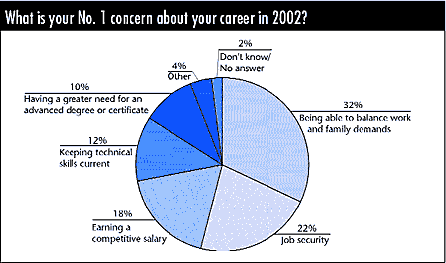
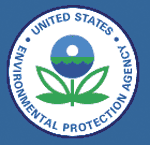 EPA
Promotes Environmental Management Systems EPA
Promotes Environmental Management Systems
The Environmental Protection
Agency’s administrator, Christie Whitman, has issued
a position statement on environmental management systems.
In the statement, Whitman promotes broader use of systems
such as ISO 14000 to help companies fulfill their environmental
responsibilities.
The EPA has adopted a policy encouraging the use of EMSs
across a variety of industries to achieve improved environmental
performance and compliance, pollution prevention through
source reduction, and continual improvement of environmental
practices.
“The EPA will encourage the use of recognized environmental
management frameworks, such as the ISO 14001 standard, as
bases for designing and implementing EMSs that aim to achieve
outcomes aligned with the nation’s environmental policy
goals and the principles of this position statement,”
Whitman says.
According to the statement, organizations that use environmental
management systems are encouraged to acquire stakeholder
input and to share information on their EMS’s progress
and performance with public and government agencies.
The EPA plans to implement environmental management systems
at some of its facilities in an effort to lead by example.
In addition, the EPA will work with state and local governments
to promote environmental management systems and will support
training and research on the costs and benefits of the system.
For more information, visit
www.epa.gov.
Educators Gather to Discuss Quality Circles
in Schools
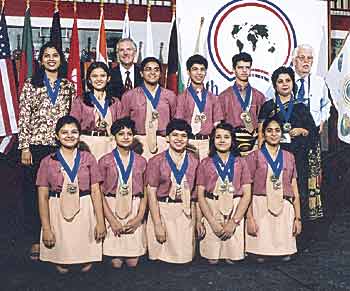
Gary Convis, president of
Toyota USA (rear middle), and Don Dewar, president
of QCI International (rear right), awarded a medal
to each member of a winning quality circle from the
Ryan International School in India.
|
More than 1,000 people from
15 countries gathered during a three-day conference to discuss
quality tools in education. Held June 11–13 in Georgetown,
Kentucky, the fifth annual International Convention on Students’
Quality Control Circles was hosted by the Scott County Board
of Education and co-sponsored by the World Council for Total
Quality and Excellence in Education, headquartered in Lucknow,
India.
Jagdish Gandhi, president of the World Council, challenged
teachers and parents to instill learning principles in their
children at a young age. In 1959, Gandhi founded the City
Montessori School in Lucknow. Since that time the number
of pupils has risen from five to 25,000 and includes students
from kindergarten to high-school levels. The school was
recently awarded the 2002 Peace Education Prize from the
United Nations Educational, Scientific and Cultural Organization.
Administrators in the Scott County School District proclaimed
June 8–15, 2002, as ICSQCC Week in an effort to motivate
local schools to establish student quality control circles.
Gandhi was presented with the Georgetown Key to the City
by Mayor Everette Varney.
The next ICSQCC will be held in Lucknow in December 2003.
For more information, contact Vineeta Kamran at cmsicsqcc@cmsicsqcc.org
or visit www.cmsicsqcc.org.
ISO 9000 and 14000 Certifications Surge
in 2001
In its eleventh cycle of tracking
ISO standards certifications, the International Organization
for Standardization reported record levels of ISO 9000 and
ISO 14000 certifications in 2001. This development is outlined
in The ISO Survey of ISO 9000 and ISO 14000 Certificates,
an annual ISO publication.
By December 2001, at least 510,616 ISO 9000 certificates
had been issued in 161 countries and economies, an increase
of more than 24 percent (101,985 more certificates) from
the previous year. It’s the highest reported increase
in all 11 cycles of the survey, carried out since January
1993.
Of those ISO 9000 certificates, 44,388 were certificates
of conformity to ISO 9001:2000, the single standard developed
to replace the 1994 versions of ISO 9001, 9002 and 9003.
The revised standard accounts for more than 43 percent of
the certificates awarded in 2001 and more than 8 percent
of the overall total.
Through December 2001, at least 36,765 ISO 14001 certificates
had been awarded in 112 countries or economies, an increase
of more than 60 percent (13,868 more certificates) from
the previous year. In December 2001, the total stood at
22,897 in 98 countries. This is the highest recorded increase
since ISO 14000 certification numbers were added to the
survey in December 1995.
Among these findings, the study revealed the following
statistics:
• 269,950 ISO 9000 certificates were issued in 51
countries in Europe, 22,888 of which were ISO 9001:2000.
• 126,779 ISO 9000 certificates were issued in 21
countries in the Far East, 14,434 of which were ISO 9001:2000.
• 50,984 ISO 9000 certificates were issued in North
America, 1,887 of which were ISO 9001:2000.
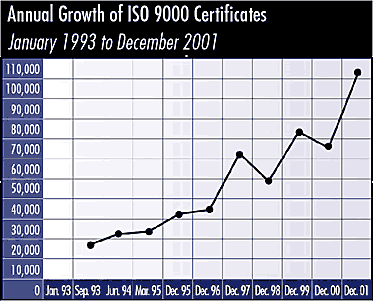
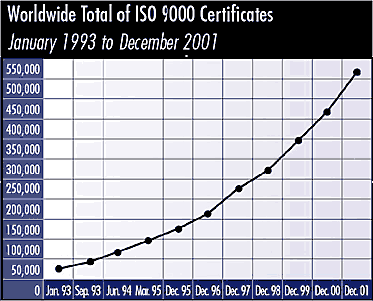
• 18,243 ISO 14001 certificates were issued in 41
countries in Europe, up from last year’s total of
11,021 in 36 countries.
• 12,796 ISO 14001 certificates were issued in 15
countries in the Far East, up from last year’s total
of 7,881 in 14 countries.
• 2,700 ISO 14001 certificates were issued in North
America, up from last year’s total of 1,676.
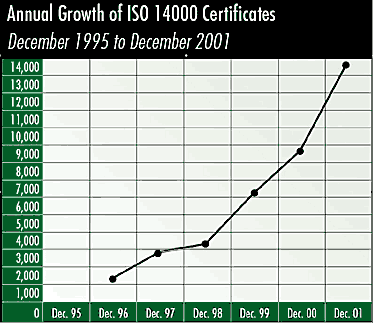
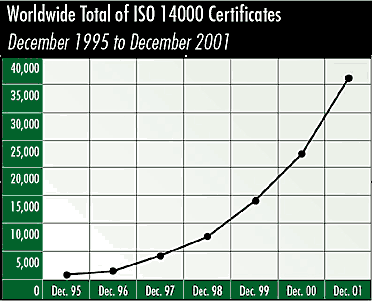
The ISO Survey of ISO 9000 and ISO 14000 Certificates
includes country-by-country totals, a list of top six countries
for growth in 2001, a list of first-time certified countries,
a worldwide breakdown of certificates by industrial sector
and a breakdown of withdrawn certificates. It’s available
for about $30 as a combined report and CD-ROM from any of
ISO’s national member institutes, a complete list
of which can be found at www.iso.org.
ASQ Offers Auditor Certification in Biomedical
Technology
The American Society for Quality
is now offering Certified Quality Auditor—Biomedical
certification. The certification is ideal for individuals
currently involved in management or conduct of biomedical
quality audits or who have a working knowledge of the relevant
national and international regulations and standards associated
with biomedical quality audits.
The biomedical certification recognizes knowledge of planning,
managing, conducting and reporting quality audits in biomedical
technology areas, including but not limited to certification
of testing laboratories, research-and-development organizations,
manufacturing organizations, and equipment service facilities
in areas such as medical devices, in vitro diagnostics and
biologics.
To be eligible, applicants must be an ASQ Certified Quality
Auditor and have two years’ experience working with
biomedical auditing. The two-year requirement can be part
of the eight-year requirement used for the ASQ CQA exam.
The CQA Biomedical examination consists of 100 multiple-choice
questions and is offered in English only.
Local ASQ sections and international organizations conduct
examinations in March and October. The open-book exam is
four hours long. Each participant must bring his or her
own reference materials and calculators. For further information
and requirements, visit www.asq.org/types/
cqa-bio/index.html or call (800) 248-1946 and request
item B1245.
Mark Your Calendars for Customer Service
Week
Despite the increasing amount of impersonal buying and
selling habits (thanks in part to online shopping), there
will always be the need for a personal connection between
company and customer. More often than not, customers who
aren’t happy or have questions about a recently purchased
product prefer to speak to a real person rather than the
automated voice that prompts a seemingly endless routine
of button-pressing.
That person is the customer service representative. Whether
working from a call center or answering questions online,
the customer service representative is the direct link between
your company and your customers.
Oct. 7–11 marks the 14th annual Customer Service
Week celebration, honoring CSRs and recognizing the importance
of customer service to a company’s bottom line. The
Customer Service Group, an organization that promotes Customer
Service Week, has set up a Web site to assist companies
that are interested in participating. With one month left,
there’s still time to plan a celebration. This year’s
theme is “Caring for Customers.” For information
about Customer Service Week products and bulletins, visit
www.csweek.com.
• Select a chairperson to lead the project. Either
assign the position or ask for volunteers.
• Choose an honorary chairperson. Ask the CEO, president
or department head to be an honorary chairperson. Having
a CEO take part in the celebration helps send the message
that the work customer service representatives do is appreciated.
• Choose captains. Select a person in charge of each
celebration activity, such as food and decorating. Or, have
individuals be in charge of a single day’s events.
• Hold kick-off and wrap-up parties. Invite senior
management to discuss the role customer service plays in
the company’s success. Wrap up the week with a special
lunch or dinner out of the office and away from phones.
• Create a festive atmosphere. Decorate the customer
service department with posters, banners and balloons.
• Brag. Customer service week presents a good opportunity
to inform the entire company about the work of the customer
service department. Compile information on the number of
calls handled in a typical week, the dollar value of cross-selling
in the past year and positive survey results.
• Hold “Executive on the Phone Day.”
Have managers, directors and the president of the company
handle incoming calls. Send a letter to customers thanking
them for their support. Include a mission statement and
photograph of the customer service team.
• Publicize the event. Ask the president or CEO to
include an article in the company’s newsletter on
the importance of customer service. Answer the phones with
“Thank you for calling during Customer Service Week.”
• Acknowledge other departments. Distribute certificates
of appreciation and service awards to individuals in other
departments who make efforts to meet customers’ needs.
• Hold training sessions. During Customer Service
Week, plan a few skill-building workshops.
 Accredited
Schools Share Quality Projects Online Accredited
Schools Share Quality Projects Online
Higher education organizations
interested in improving their processes are invited to view
the Action Project Directory, an online documentation of
schools’ progress toward accreditation by the Higher
Learning Commission. The directory is housed at the Academic
Quality Improvement Project’s Web site at www.aqip.org.
Supported by a grant from the Pew Charitable Trust, the
Academic Quality Improvement Project assists higher learning
institutions in aligning their continuous improvement projects
with their reaccreditation efforts. The AQIP process involves
working toward improvement through facilitated peer reviews
and helping each institution select, critically examine
and commit to action projects that drive quality improvement.
The Action Project Directory features information and
updates on Higher Learning Commission-accredited schools
and their progress toward reaching their re-accreditation
goals. The Higher Learning Commission is part of the North
Central Association of Colleges and Schools, serving 19
states. Through commissions, it accredits and thereby grants
membership to educational institutions in the North Central
region. Learn more at www.ncahigherlearningcommission.org.
Two Metrology Companies Merge
Veeco Instruments Inc. and
FEI Co. have signed a merger agreement combining the companies
into one 3-D metrology and process equipment company: Veeco
FEI Inc.
“This merger has compelling strategic value,”
says Vahe A. Sarkissian, chairman of the board and chief
strategy officer of Veeco FEI. “We intend to leverage
our enriched technology portfolio to accelerate growth and
deliver broader product offerings to our customers.”
“Based on combined sales of $825 million in 2001,
we will become the sixth-largest U.S. semiconductor equipment
company and the third-largest U.S. supplier of metrology
equipment,” adds Edward H. Braun, CEO and president
of Veeco FEI.
Veeco is a leader in process equipment and metrology tools
for the telecommunications/wireless, data storage, semiconductor
and research markets. Learn more at www.veeco.com.
FEI is a supplier of 3-D structural process management solutions
to semiconductor, data-storage, structural biology and industrial
industries. More information can be obtained at www.feico.com.
Industry
News
The National Institute of Standards and Technology and
Sematech, a consortium of semiconductor companies, have
released the NIST/ Sematech e-Handbook of Statistical Methods,
a Web-based guide for professionals who use statistical
techniques.
The guide provides an overview of statistical methods,
including experimental design, data analysis and quality
control. It includes case studies from the semiconductor
industry and from NIST laboratories. The Web site also includes
links to integrated software packages. The e-handbook is
available at www.nist.gov/stat.handbook.
It will be available on CD later this year.
Nikon Instruments Inc. has formed the Nikon Semiconductor
Inspection Technologies Group in an effort to offer more
comprehensive service and support to the company’s
customer base. Nikon aims at quadrupling its sales and technical
support and broadening U.S. distribution of advanced semiconductor
inspection products.
The Phoenix-based group will provide training, demonstrations,
service application support and direct U.S. sales of semiconductor
products. Takashi Tanzawa has been named executive vice
president of the group. Tanzawa is the former manager of
strategy for Nikon Instruments Co. in Japan. Learn more
at www.nikonusa.com.
Mitutoyo America Corp. has launched www.mitutoyo.com,
which contains enhanced features, including the company’s
product catalog, expanded product group information, case
studies and a new section that covers technology trends
in metrology and manufacturing.
“Something we’re very excited about is WebLink,”
says Mark Izumi, Mitutoyo’s media marketing manager.
“This is a vehicle that allows our visitors to view
a condensed version of our Web site, with the most current
news and information, right from their desktop.” WebLink
updates itself every time an Internet connection is made.
The American Society for Quality will host its first Quality
Applications Institute, Sept. 22–25 in Milwaukee.
Fifteen of ASQ’s most popular training courses have
been abridged to highlight the fundamentals of several different
quality practices.
QAI will focus on three tracks: improving business performance,
quality engineering and statistics, and ISO quality systems.
Event registration is $850 for ASQ and Association for
Quality and Participation members and $950 for nonmembers.
Student registration is $125. For more information, call
(800) 248-1946 and request brochure B1291 or visit www.asq.org/ed/conferences/qai.html.
|